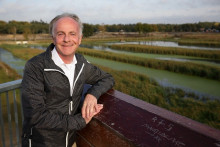As a real expert in the field of water management, Bressers presented a lecture on water governance and the Governance Assessment Tool, which is the latest result of the mentioned DROP (Benefit of Governance in Drought Adaptation) project.
20 years of research
The University of Twente is one the partners in the DROP project, which stands on a collaboration of authorities and research institutes from five different countries: the Netherlands, Germany, Belgium, France and the UK. 'DROP is a part of adaptation to climate change within Europe. It is an important project and it also represents 20 years of research of our department - CSTM,' says Bressers.
Lack of water is equal to floods
When talking of water problems, most people think of floods. Droughts are generally considered an issue only if it comes to fresh water supply. However, a lack of water can have equally or even more severe impact as an abundance of water. 'Take Amsterdam, for instance,' clarifies Bressers. 'Amsterdam is built on wooden poles. Those can last for centuries as long as they are submerged in water, because they don´t rot in there. But if there isn´t enough water and the poles are exposed to air, they can get destroyed.'
Water governance
To avoid destruction of cities and dangers for nature and agriculture, drought prevention is crucial. And this prevention can´t be accomplished without appropriate governance; integrated governance that is. 'If it comes to water projects, many different sectors need to be combined. You need to involve agriculture, city planning, nature development, tourism etc. Working together is unavoidable, especially in such a densely populated country as the Netherlands,' says Hans Bressers.
Governance Assessment Tool
Collaboration is necessary, but also very difficult. To guide countries and regions through the process of water management, the scientists involved in the DROP project have created Governance Assessment Tool. This tool helps stake holders to implement necessary measures to prevent water problems, such as droughts. For instance, one of the preventive measures applied within Twente has been an elevation of creeks, mentions Bressers: 'Creeks used to be deepened in order to increase drainage. It turned out that it also increased droughts, so now the creeks are being filled up again.'
Low awareness
Although the DROP project is in its final phase, there is still a lot of work to be done in the field of drought prevention. 'Drought risk awareness is still low. Preventive measures are only voluntary at this point and companies and general public are not very involved,' concludes Professor Bressers. 'Flooding is still seen as the priority problem, even though droughts can have just as bad social and economical consequences.'







